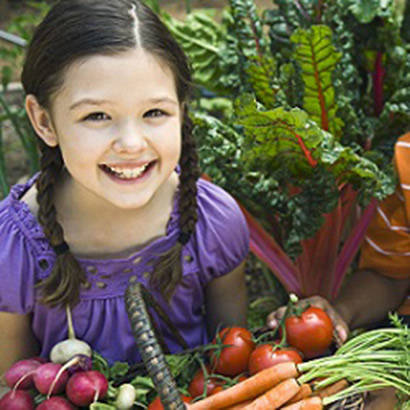
Eugene’s community garden program has child- and youth-oriented gardens in each of three community centers: Sheldon, River House, and Peterson Barn Park. Sheldon and River House are located in predominantly middle to upper middle class neighborhoods. Peterson Barn Park, however, is in Bethel, a low-income, ethnically diverse neighborhood with a large Latino population. There are about 200 children involved in gardening among the three sites. Community center staff and volunteers from the surrounding neighborhoods work with children in each garden. The food the children grow is used for snacks and to take home to their families. There are also plans to provide food to the local food bank in the future.
The goals of Eugene’s project are twofold. First, to engage children and youth in growing fresh produce for consumption and second, to teach them gardening skills, health, nutrition, environmental awareness, and principles of sustainability. This project fits well into the outdoors- and environmentally-oriented culture of Eugene. As Molly Elliott, recently retired Adaptive Recreation Services Program Supervisor in Eugene’s Recreation Department, stated: “The City of Eugene has a strong sustainability initiative that influences our youth development strategies. We envision connecting youth to natural environments with the opportunity to develop, plan, and provide healthy food choices for themselves and also providing fresh produce for the local food bank.”
Each community garden has its own distinctive characteristics. The gardens at Sheldon and Peterson Barn Park community centers were designed specifically for children and youth. The garden at River House, however, is larger and is part of the Recreation Department’s Community Garden program, which is open to the public. In addition to working in the gardens, the children have cooked meals using food they harvested, made soap from lavender and flower pots, and created stepping stones from recycled materials.
The Sheldon Community Center garden operates year-round as part of an after-school program and a summer day-camp. Approximately 125 children between the ages of 6 and 16 work in the garden. The children work in the garden on a weekly basis, and a curriculum-based program is used to teach them gardening skills, nutrition, and recycling. The children were involved from the earliest stages in designing the garden. They decided what to plant, used precut lumber for the beds, made walkways to connect the beds, mixed the soil, filled the beds, spread compost and mulch, and planted the garden. Before the garden program began, there was only bare earth where there are now raised beds.
The staff included a pretest and posttest to measure how much the children learn over the summer. Topics included knowing the difference between beneficial and harmful insects, what pollinates garden plants, and what lives in the ground that is good for plants.
River House Community Center already had an established adult community garden when the staff decided to initiate a summer program targeting children ages 10 to 16 who have a special interest in gardening. About 11 children have been involved with this project on a weekly basis. In addition to gardening at the community center, children also visit other gardens around the city. As Ms. Elliott described, “We targeted kids [who] were really interested in gardening. [They] really wanted to learn about gardening and they bonded as a group and with their instructor …” There are also month-long summer day-camps with a gardening focus at the community center.
The garden at Peterson Barn Park is part of a free summer playground program in a low-income neighborhood. This program is oriented toward younger children between the ages 6 to 10. Staff at the community center attempted to involve the children from the neighboring school in gardening as part of the after-school program. However, the children showed little interest during the school year. Fortunately, the children’s enthusiasm grew during the summer playground camp.
NRPA grant funding, community partnerships, and volunteers have all been instrumental in creating and sustaining Eugene’s children’s garden program. Grant funds were used at Sheldon to create a garden where there was none by purchasing materials and tools to construct beds. River House used funds to develop the intensive gardening program for a targeted group of children as well as the summer gardening camps in the existing community garden. Peterson Barn Park used the funds to develop the children’s gardening program. Partnerships have been developed with Walmart, which donated seeds, and with local greenhouse owners. The greenhouse owners cleared space so that the children could plant seedlings. In addition, one greenhouse owner had a composter that was no longer needed, so the community garden program bought it for the cost of materials. The program has also developed a resource notebook of local gardening organizations that will foster partnership development. Finally, staff time with the children has been extended by an active group of adult volunteers, from college students to retirees, at all three gardens.
Having become an important part of Eugene’s gardening culture, the Recreation Department’s garden program is being sustained through the department’s general operating funds because of grant funding, partnerships, and volunteers.
